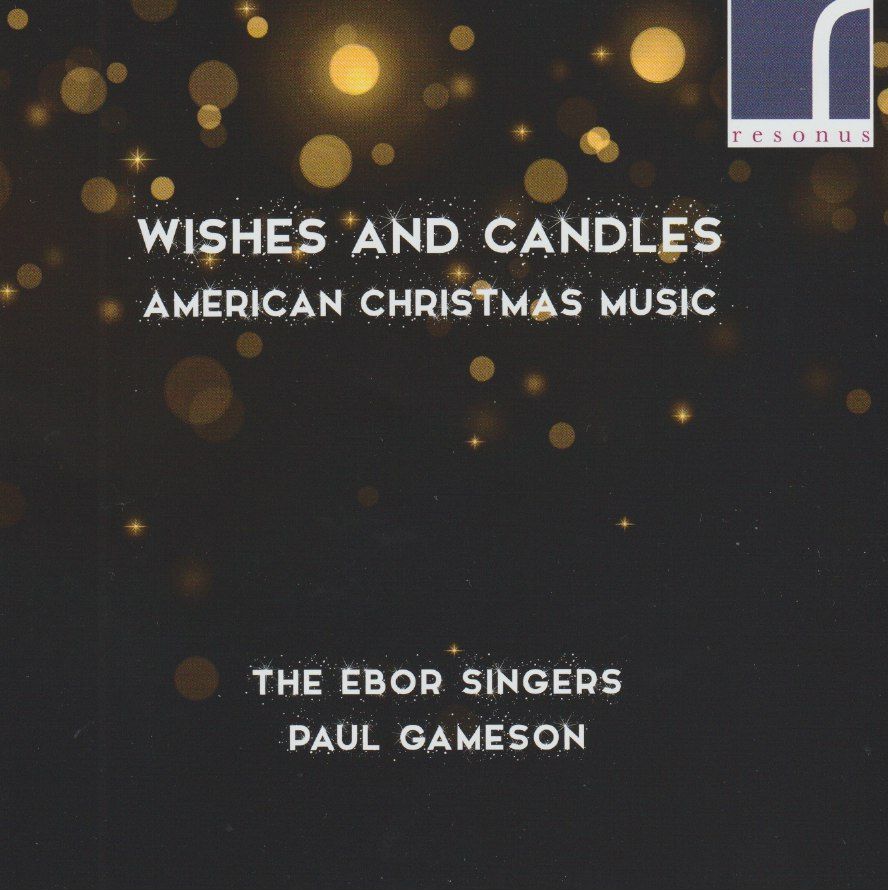Wishes and Candles: American Christmas Music
It's that time of year again .. and this is a great way to launch our Christmas reviews

It's that time of year again. The Christmas adverts are on TV, the Christmas Channel is once more operativem there's a free mince pie in my veggie box ... and so the discs arrive.
Here is one predicated on. a lovely idea - a celebration of the American Christmas tradition. This tradition represents a confluence of styles, both sacred and secular, reflecting perhaps that great country's own mix of styles and nationalities. Interestingly, the vocal group celebrating this embarassment of riches hails from the North of England - The Ebor Singers. They are a beautiful sounding group, brilliantly disciplined yet with a gorgeously warm sound which, of course, fits this music beautifully. Paul Gameson is clearly a highly expert choral director: not a step is out of line in this beautifully produced and recorded disc.
We certainly begin on familiar territory with the traditional The Angel Gabriel, but in a superbly bright and fresh arrangement bySusan LeBarr, a Missouri-based composer (UK readers are probably more used to Edgar Pettman's arrangement):
Based in Missouri and of Australian-American origin, Melssa Dauphy offers a terrific piece, O Oriens, which uses plainchant as a constant while elaborating all around in luminous fashion - the lines are like bands of light:
It is an ingenious idea to mix American works (a stunning Lauridsen O magnum mysterium, for example, with some incredibly well controlled pianissimi, something we hear again in Gerald Custer's Bululalow) with more familiar traditional Christmas music in arrangements by American composers. The mix is vibrant and srong, and ultimately heart-warming.
It strikes me impressive that Dan Forrest's The Work of Christmas is a call for all of us to drop our mince pies and cream, and to live out the Christmas story in practical ways. It sets a text by civil rights leader Howard Thurman:
For me, one of the most fascinating aspects of this disc is the alternative settings of carols we all knoow and love. A case in point is When Shepherds watched their flocks by Night. Dan Forrest at work again here. Give it a chance. It's not just the harmonies that glow, its the way the melody flows:
Those last two above are juxtaposed on the disc as well, so you get a piece by Forrest, then one of his arrangements. It's a format that is repeated over the course of the disc, next with Stephen Paulus' arrangement of Silent Night (with Gruber's tune), with the most beautiful soprano solo from Alisun Russel Pawley, followed by a piece by Paulus himself. Here's Silent Night:
.. .and here his Paulus' own In the moon of wintertime, a setting of a translation of a 17th century Canadian Huron carol. Harmonically it is masterly, with well-timed use of pure octaves:
Worth seeking out Paulus' The Holly and the Ivy, perhaps, for its imaginative use of solo oboe (the excellent Jane Wright piping away there at the beginning) with choir.
The disc also offers wo settings of O magnum mysterium: the familiar Lauridsen mentioned above, and also one by René Clausen, which briefly quotes Victoria's setting. The harmonic process - kind of bleedings into and out of clusters - is fascinating, as is the way he retains dissonance but still allows for radiant ascents to climaxes:
We have a piece by an American jazzer here too: Alfred Burt, who also wrote some 15 carols between 1942 and 1954. It is beautiful in a traditional way, notable in this performance for the purity of the soprano descant towards the work's close.
Interesting to hear a folk-like Shaker style in Abble Bettins' Carol of the Stranger, as region-specific as you can get - and it works brilliantly thanks also to the accuracy of The Ebor Singers' performance:
There is a selection of arrangements and pieces by Matthew Colloton (of Concordia College amd Minnseota University). For me, the most fascinating of the arrangements is In dulci jubilo; there are added jazzy elements and while all might seem relatively familiar to start with, it kind of moves in and out of focus as the music takes different paths:
Collloton's arrangement of Hark! The Herald Angels Sing takes the melody we know so well, and sets it imaginatively including antiphonal effects.
The final track is the one that gives the disc its name, Wishes and Candles, wherein the choir is joined by harpist Rachel Dent. It is, surely, the perfct close:
Not just a heart-warming disc, but as fascinating mix of cross-connections, new arrangements and the familiar, all supremely performed.
